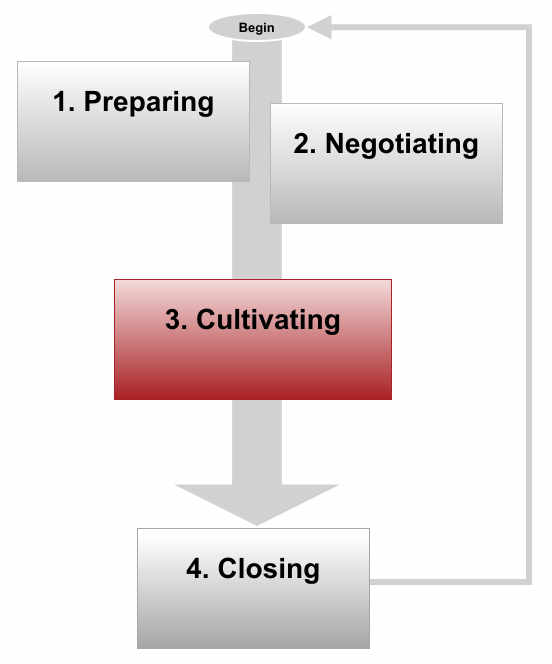Phase 3: Cultivating


In the cultivating phase, mentors and mentees implement the plans they developed during the negotiating phase. These plans might incorporate several of the career-enhancing and psychosocial functions that we described earlier in this course, tailored to support the mentee’s personalized needs and goals.
The cultivating phase can also benefit from some structure. Having regularly scheduled mentoring meetings is one way to make sure the relationship is not neglected. Mentees can designate specific topics of discussion according to their priorities. In subsequent meetings, mentors can check-in on progress and accomplishments. Routine interactions also increase the likelihood that a mentee’s challenges and any conflicts in the mentoring relationship are identified early on, with time to problem solve.
Of course, mentoring is not simply transactional. These relationships must be carefully nurtured to establish trust, foster candid communication, and remain flexible (for example, to adapt to a mentee’s growing independence, dominant learning style, unique challenges, or change in career path).17,18 We discuss some of these relationship building strategies in the next section of this course.
Expert Advice
- Studies have found a correlation between frequency of contact and satisfaction with the mentoring relationship.19,20 Although a lot of mentoring can happen in group settings such as research team meetings, these are no substitute for one-on-one focused time with your mentees.
- Before a mentoring meeting, create some meeting objectives and share them with your mentee. Alternatively, consider asking your mentee to set the agenda. Clarify if any pre-work needs to be done ahead of time for you to get the most out of the meeting. For example, your mentee might prepare a list of goals for the next few weeks, or you might read a section of your mentee’s manuscript.
- Start the meeting with a personal and professional check-in to see what other issues might be impacting your mentee. Consider making topics such as work-life balance or satisfaction with the work environment a standing item for each meeting and for every mentee. Also, routinely invite feedback on your approach to mentoring.
- Before the meeting ends, ask your mentee if there is anything else that would be helpful to discuss. This allows space for discussing unforeseen challenges or broaching more sensitive topics.
- It is important to connect with your research mentees outside of formal meetings, be this emailing information about relevant opportunities or chatting at larger gatherings. Engaging with your mentees in public settings can help affirm your commitment to them and signal to others that you are invested in their success.

